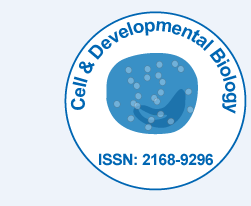
Cell & Developmental Biology
Open Access
ISSN: 2168-9296

ISSN: 2168-9296
Perspective - (2024)Volume 13, Issue 5
Growth factors plays an important role in modulating cell proliferation and maintaining tissue homeostasis. These signaling molecules, which include a variety of proteins and peptides, influence numerous cellular processes such as growth, differentiation, and survival. Understanding their mechanisms is essential for developing therapeutic strategies for various diseases and injuries.
Overview of growth factors
Growth factors are typically secreted proteins that bind to specific receptors on the surface of target cells, triggering intracellular signaling pathways that lead to changes in gene expression and cellular behavior. They can promote or inhibit cell proliferation, influence cell differentiation, and modulate the Extracellular Matrix (ECM) composition, which is vital for tissue integrity and function.
Major types of growth factors
Transforming Growth Factor-Beta (TGF-β): TGF-β is a multifunctional cytokine that regulates cell proliferation, differentiation, and apoptosis. It plays a critical role in tissue homeostasis by maintaining the balance between cell growth and cell death. TGF-β signaling can inhibit proliferation in many cell types by inducing cell cycle arrest, particularly in the G1 phase.
Fibroblast Growth Factor (FGF): FGFs are involved in various physiological processes, including wound healing and tissue regeneration. They promote the proliferation and migration of fibroblasts and other cell types, facilitating tissue repair and ECM remodeling.
Platelet-Derived Growth Factor (PDGF): PDGF is essential for the recruitment of cells to sites of injury and plays a significant role in the proliferation and migration of fibroblasts and smooth muscle cells. It is particularly important in wound healing and tissue repair processes.
Epidermal Growth Factor (EGF): EGF stimulates cell proliferation and is particularly important in the early phases of tissue repair. It enhances the proliferation of Mesenchymal Stem Cells (MSCs) and promotes their paracrine activity, which is crucial for tissue regeneration.
Mechanisms of action
Growth factors exert their effects through specific receptors, which often possess intrinsic kinase activity. Upon binding of a growth factor, these receptors undergo conformational changes that activate downstream signaling cascades, such as the MAPK/ERK pathway, PI3K/Akt pathway, and others. These pathways ultimately lead to alterations in gene expression that dictate cellular responses, including proliferation, differentiation, and survival.
TGF-β signaling
TGF-β signaling is particularly complex and context-dependent. It is activated by environmental cues and can either promote or inhibit cell proliferation based on the cellular context. For instance, in the presence of injury, TGF-β can recruit stem/ progenitor cells to facilitate tissue repair. However, dysregulation of TGF-β signaling can lead to pathological conditions such as fibrosis, cancer, and autoimmune diseases.
Role in tissue homeostasis
Tissue homeostasis is maintained by a delicate balance between cell proliferation and apoptosis, with growth factors playing a pivotal role in this regulation. For example, TGF-β not only inhibits excessive cell growth but also promotes ECM production, which is essential for maintaining tissue structure and function. This balance is important for normal physiological processes, including wound healing and tissue regeneration.
Implications for therapy
Given their central role in cell signaling and tissue homeostasis, growth factors are being explored as therapeutic agents in regenerative medicine. For instance, modulating TGF-β signaling has shown promise in treating conditions like fibrosis and cancer metastasis. Similarly, administering specific growth factors can enhance tissue repair in injuries and degenerative diseases.
In summary, growth factors are integral to the regulation of cell proliferation and the maintenance of tissue homeostasis. Their ability to modulate cellular responses makes them valuable targets for therapeutic interventions in various health conditions. Continued research into the mechanisms of growth factor signaling will enhance our understanding and application of these molecules in medicine.
Citation: Alessio M (2024). Role of Growth Factors in Modulating Cell Proliferation and Tissue Homeostasis. Cell Dev Biol. 13:368.
Received: 03-Aug-2024, Manuscript No. CDB-24-33848; Editor assigned: 06-Aug-2024, Pre QC No. CDB-24-33848 (PQ); Reviewed: 20-Aug-2024, QC No. CDB-24-33848; Revised: 27-Aug-2024, Manuscript No. CDB-24-33848 (R); Published: 03-Sep-2024 , DOI: 10.35248/2168-9296.24.13.368
Copyright: © 2024 Alessio M. This is an open-access article distributed under the terms of the Creative Commons Attribution License, which permits unrestricted use, distribution and reproduction in any medium, provided the original author and source are credited.